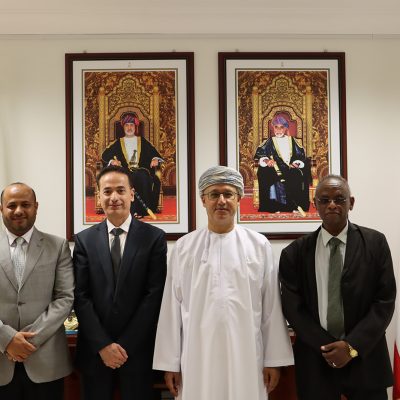
Conference “The Role of Law in Environmental Protection” at the College of Law, University of Dhofar
The College of Law at the University of Dhofar opened the first day of its international virtual conference titled “The Role of Law in Environmental Protection” on Wednesday, May 22, 2024. The conference began with the national anthem of the Sultanate of Oman, followed by the recitation of the Holy Quran. Dr. Ahmed Mohamed Al-Zain, the Dean of the College of Law and the conference chair, then welcomed the participants from various countries and spoke about the importance of the conference, which aims to raise environmental awareness and shed light on the challenges and issues facing environmental legislation.
Next, Dr. Nabhaan Al-Ma’awali, the Dean of the Higher Institute of the Judiciary, delivered a keynote address, focusing on the human right to a clean environment. This was followed by a keynote speech by Dr. Rashid Al-Balushi from the College of Law at Sultan Qaboos University, who discussed the importance of laws and legislation in environmental protection. In the first session of the conference, six researchers from universities in Oman, Saudi Arabia, Algeria, and Egypt presented their work, which focused on the contribution of laws in environmental protection, an overview of the main environmental laws in some countries, especially Oman, the criminal protection of the environment from electronic waste pollution, and the legislative protection of biodiversity and its impact on environmental conservation. The second session was chaired by Prof. Dr. Zakaria Abdel-Wahab Mohamed Zein from the College of Law at the University of Dhofar. Six researchers from Algeria, Jordan, Tunisia, and the United Arab Emirates presented on the role of international law in protecting and rehabilitating the environment after armed conflict, combating desertification, international liability for marine pollution, and the impact of technological developments on the effectiveness of environmental legislation implementation. The first day of the conference concluded, in the next day The activities of the conference, which lasted for two days from 22-23/5/2024, concluded yesterday, Thursday, 23/5/2024. The conference was attended by a group of researchers and experts from various Arab countries, under the patronage of Prof. Dr. Amer Ali Al-Rawas – Vice Chancellor of the University, and under the chairmanship of the Dean of the College of Law, Dr. Ahmed Mohamed El-Zain. The conference addressed urgent environmental issues and the importance of legal legislation in preserving the environment. During the scientific sessions and interactive discussions, the participants presented research papers and in-depth studies that addressed the current environmental challenges and ways to strengthen the legal framework for their protection.
At the conclusion of the conference, the conference made recommendations, the most important of which are:
- International law scholars should expand the foundations of international responsibility in line with the resulting damage.
- Establishing international monitoring mechanisms, aiming to ensure the protection of the environment and its natural resources during armed conflicts.
- The need for regional cooperation between countries, i.e. the establishment of specific agreements focusing on the issue of desertification, whether for developing or developed countries.
- The necessity of the development of environmental jurisprudence, applying the principles contained in the general and specialized environmental legal texts.
- Recommending to the national legislator in each country to establish a national observatory for environmental protection.
- Paying attention to the environment by establishing a specialized environmental judiciary that seeks the assistance of technical experts as a manifestation of the interest in the environment.
- Developing the technical infrastructure, through investment in the development of the necessary technological infrastructure for environmental monitoring, detection of violations, and the provision of appropriate technology through partnerships between the public and private sectors, benefiting from international financing sources, and developing low-cost technologies, as well as building human capacities in the use of technology in the field of environmental protection.
- Work to engage civil society in the field of environmental protection and promote the culture that everyone is responsible for the process of preserving the environment.
- The need to issue the necessary legal legislation that ensures the commitment of states to clean technology techniques, in order to reduce climate change and preserve the environment.
- Protecting the environment and behind it environmental security requires more international efforts to reduce environmental threats and risks by following clear policies and strategies that the entire international system is committed to following, especially in light of industrial development and economic competition that has negatively impacted global environmental security.
- Raising awareness of the laws in force in the Sultanate of Oman and working to implement them in all contemporary and available legal methods and means.
- Integrating and unifying all environmental regulations into a unified code that is agreed upon by the countries of the world, which will serve as an international environmental law.
- Support research and development in the field of recycling electronic waste and developing environmentally friendly technologies.
- Educational institutions and the media must play their educational role in spreading and enhancing the culture of environmental concern.
- Achieving economic development within the framework of sustainable development to preserve the environment from deterioration.
- Work with various governmental and non-governmental international organizations in order to pressure major companies to shift to the green economy and environmental investment.
- Enhancing Arab and international cooperation in the environmental field, updating environmental laws to keep pace with global developments, encouraging specialized scientific research, and enhancing environmental awareness among different segments of society. The conference also recommended the need to establish a regional body to follow up on the implementation of environmental laws and exchange experiences among Arab countries.
The participants appreciated the organizers’ efforts for the conference, expressing their hope for the continuation of such events that contribute to building a sustainable environmental future.




